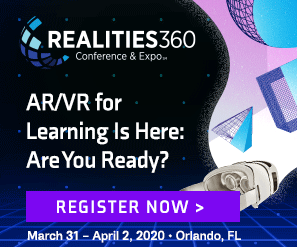David Kelly’s Curated L&D Content for the Week of 2/24/20

David Kelly, Executive Director, The eLearning Guild
This week’s curated content includes links exploring the following:
-
- Simple things you can do to improve the accessibility of your learning programs
- Onboarding lessons from the world of gaming
- A look at the three skills needed to improve time management
- Powerful tools that may make you rethink paying for PowerPoint
- A great example of how visuals can be used as a learning tool
- Great tips to help get you unstuck on your next development project
Don’t Assume: Test for Accessible and Responsive eLearning by Joanne Astorga
Accessibility is something most learning professionals agree is important, but many struggle with putting it into practice. This post by Joanne Astorga looks at why Accessibility is so important and provides a simple checklist you can follow to improve the accessibility of the programs you build.
3 fundamental user onboarding lessons from classic Nintendo games by Jackson Noel
Onboarding is a regular need and challenge for organizations and the learning professionals that support them. This post looks at an area that onboards people extremely well – gaming – and how we could apply those lessons to the onboarding experiences we build.
Time Management Is About More Than Life Hacks by Erich C. Dierdorff
I’m someone that, admittedly, loves a productivity hack. This post by Erich C. Dierdorff looks beyond the latest hacks to look at the three core skills that a person needs to develop to truly improve time management: Awareness, Arrangement, and Adaptation. I’ll probably still look at the next hack, but this post is a nice reminder of the core elements that drive real change.
These 4 powerful PowerPoint alternatives won’t cost you a dime by Doug Aamoth
PowerPoint is a common tool used by learning professionals; it can also be costly. This post looks at four alternatives to PowerPoint that are budget-friendly. In addition to highlighting low-cost alternatives, this post might make you rethink what you expect from a presentation tool and how you might use one.
Mapped: Visualizing the True Size of Africa by Jeff Desjardins
This post by Jeff Desjardins looks at how big Africa is by showing how many other countries and continents can fit inside its borders. It’s a fascinating piece of information that I share here as a great example of how visuals can be used to explain and educate. This post actually has two distinct visuals that I really like: The aforementioned shape of Africa with other landmasses in its borders, and another visual that explains how typical maps contribute to the misconceptions around Africa’s size.
6 Creative Solutions to Bypass Development Roadblocks by Phil Cowcill
We’ve all had that moment when we’re building a learning program and we hit a roadblock. This post by Phil Cowcill looks at six different things you can consider doing the next time you find yourself stuck in developing a project.
Three Great Reasons to Attend Realities360
 The Realities360 Conference and Expo is the premier event exploring how augmented and virtual reality can transform education and training. The conference brings together early adopters from all over the world for a singular purpose: to share and expand proven practices and harness the potential of AR & VR for learning.
The Realities360 Conference and Expo is the premier event exploring how augmented and virtual reality can transform education and training. The conference brings together early adopters from all over the world for a singular purpose: to share and expand proven practices and harness the potential of AR & VR for learning.
There are a host of reasons to attend the conference, but let’s focus on three specific ones that are unique when compared against other industry events.
A Conference with a Purpose: Supporting XR Adoption
When our team curates a conference, we usually have a guiding principle in mind that spaces every decision we make about the program. For Realities360, that principle is to support augmented and virtual reality adoption in our industry. In the case of emerging technologies like AR & VR, what is needed evolves each year. When we first held the conference we focused on understanding, and from there we shifted to add more skill-based sessions that explored how to design and develop these solutions. This year we’re excited to lean into use cases that give early adopters the opportunity to share their projects, and for attendees to learn from the lessons they will share.
A Focus on Solutions You Can Apply Today
While AR and VR are still emerging, they are technologies that have matured enough to solve problems and increase productivity for your organization TODAY. The Realities360 program is built with application in mind. You will find sessions that explore strategic decisions, tactical design and development tutorials, and case studies sharing proven practices that will provide you with knowledge and skills that will support you in your AR and VR projects today, and tomorrow.
Free Access to a Second Conference: Learning Solutions
New for 2020 is the collocation of Realities360 with the Learning Solutions Conference and Expo. While the focus of Realities360 is narrow, exploring the emerging landscape of augmented and virtual reality technology and how it can be used in education and training, Learning Solutions enables you to explore what works across the full spectrum of technology-enabled learning and development. Your Realities360 Conference registration provides you with complete access to the Learning Solutions program, giving you the ability to put what you learn about AR & VR into the broader context of your complete L&D strategy.
These are just a few of the reasons to consider attending Realities360 this year. Be sure to visit the event website to check out all the great experiences we’ll be hosting in Orlando this Spring.

Leave a Reply